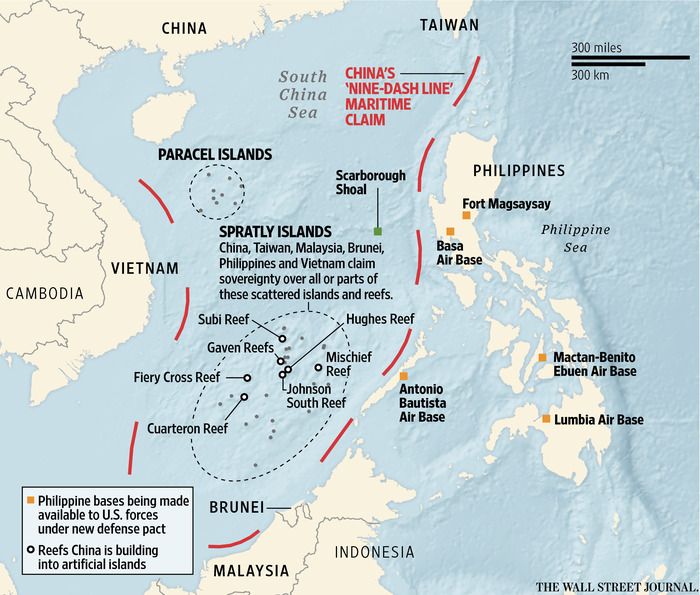State Media Urges Philippines To Remove Missiles From South China Sea

Table of Contents
China's Official Stance and its Rationale
China’s official position vehemently opposes the presence of Philippine missiles in the South China Sea. State-run media outlets like the Global Times and Xinhua have consistently framed the deployment as a provocative act that undermines regional peace and stability. Their arguments are rooted in China's expansive claim to almost the entirety of the South China Sea, based on the controversial Nine-Dash Line.
- Violation of Sovereignty Claims: Chinese state media portrays the missile deployment as a direct violation of its claimed sovereignty over the area, asserting that the Philippines is illegally militarizing disputed territories.
- Escalation of Regional Tensions: The deployment is presented as a significant escalation of regional tensions, increasing the risk of miscalculation and armed conflict.
- Threat to Regional Peace and Stability: China argues that the missiles destabilize the region and threaten peaceful navigation and trade in vital shipping lanes.
- Disruption of Ongoing Diplomatic Efforts: The presence of the missiles, according to Chinese state media, jeopardizes ongoing diplomatic efforts to resolve the South China Sea dispute peacefully.
For example, the Global Times recently published an article stating, “The deployment of missiles by the Philippines is a blatant disregard for China's territorial integrity and a provocation that could escalate the situation.” This reflects the consistent narrative pushed by Chinese state media, emphasizing the perceived threat to its sovereignty and regional stability. The historical context of China's claims, anchored in the vaguely defined Nine-Dash Line, forms the basis of their legal justification, though this claim lacks international legal recognition under the UN Convention on the Law of the Sea (UNCLOS).
The Philippines' Perspective and Justification
The Philippines, however, justifies its missile deployment as a necessary measure to protect its national interests and territorial integrity within its Exclusive Economic Zone (EEZ). The government argues that the missiles serve as a deterrent against potential aggression and are crucial for safeguarding its sovereign rights.
- Self-Defense and Protection of Territorial Interests: The Philippines maintains that the deployment is purely defensive and intended to protect its fishermen and resources within its legally defined EEZ.
- Deterrence Against Potential Aggression: The missiles are seen as a necessary deterrent to prevent further encroachment and assertive actions by other claimants in the region.
- Safeguarding Fishing Rights and Resources: The Philippines highlights the importance of protecting its fishing grounds and other resources within its EEZ, a vital source of livelihood for many Filipinos.
- Assertion of Sovereign Rights within its Exclusive Economic Zone (EEZ): The Philippines emphasizes its right to defend its legally recognized EEZ, a stance supported by international maritime law.
Statements from Philippine officials have repeatedly underscored the nation's commitment to self-defense and its adherence to international law, emphasizing that the missile deployment is within the bounds of its sovereign rights and intended to maintain regional stability, contrasting sharply with China's narrative.
International Involvement and Reactions
The escalating situation has drawn significant international attention. ASEAN, the United States, and other key players are closely monitoring developments, with varying degrees of involvement. The potential implications for regional alliances and the international legal framework, particularly UNCLOS, are substantial. The international community largely supports a peaceful resolution to the dispute, emphasizing the importance of adhering to international law and diplomatic channels. However, differing national interests and geopolitical considerations complicate a unified approach.
Potential Consequences and Future Outlook
The ongoing standoff carries significant risks. Continued escalation could lead to a military confrontation, severely disrupting regional stability and trade routes in the crucial South China Sea. However, a diplomatic solution remains possible, potentially through renewed negotiations, international mediation, or a renewed emphasis on the existing Code of Conduct in the South China Sea. International intervention, through arbitration or other mechanisms, could also play a role in de-escalating tensions and fostering a peaceful resolution. The consequences for regional stability and the flow of trade through vital South China Sea trade routes are enormous, demanding careful diplomacy and a commitment to peaceful conflict resolution.
The Urgency of De-escalation in the South China Sea
In conclusion, the debate surrounding the deployment of Philippine missiles in the South China Sea highlights the deep-seated tensions and competing claims in the region. China's insistence on the removal of the missiles is driven by its expansive interpretation of its sovereignty claims, while the Philippines justifies the deployment as a crucial measure for self-defense and the protection of its sovereign rights. The potential consequences of continued escalation are severe, threatening regional stability and global trade. The urgent need for de-escalation in the South China Sea cannot be overstated. A concerted effort toward peaceful resolution of the South China Sea dispute, through diplomatic efforts and adherence to international law, is paramount to avoiding military conflict in the South China Sea and ensuring lasting peace and stability in the region. We must prioritize diplomatic solutions and peaceful conflict resolution in the South China Sea to prevent further escalation.

Featured Posts
-
 Cote D Ivoire Le Port D Abidjan Accueille Le Plus Grand Navire De Son Histoire
May 20, 2025
Cote D Ivoire Le Port D Abidjan Accueille Le Plus Grand Navire De Son Histoire
May 20, 2025 -
 Visita Familiar Schumacher Viaja A Suiza Desde Mallorca
May 20, 2025
Visita Familiar Schumacher Viaja A Suiza Desde Mallorca
May 20, 2025 -
 Surface And Suki Waterhouse A North American Disco Tour Review
May 20, 2025
Surface And Suki Waterhouse A North American Disco Tour Review
May 20, 2025 -
 South China Sea Tensions China Pressures Philippines On Missile Deployment
May 20, 2025
South China Sea Tensions China Pressures Philippines On Missile Deployment
May 20, 2025 -
 Are Bmw And Porsche Losing Ground In China An Industry Perspective
May 20, 2025
Are Bmw And Porsche Losing Ground In China An Industry Perspective
May 20, 2025
Latest Posts
-
 The Fight For American Factory Jobs Who Will Fill Them
May 20, 2025
The Fight For American Factory Jobs Who Will Fill Them
May 20, 2025 -
 Los Angeles Wildfires A Societal Reflection In The Context Of Disaster Gambling
May 20, 2025
Los Angeles Wildfires A Societal Reflection In The Context Of Disaster Gambling
May 20, 2025 -
 Obstacles To Clean Energy Growth A Rising Tide Of Resistance
May 20, 2025
Obstacles To Clean Energy Growth A Rising Tide Of Resistance
May 20, 2025 -
 Disaster Betting The Los Angeles Wildfires As A Case Study
May 20, 2025
Disaster Betting The Los Angeles Wildfires As A Case Study
May 20, 2025 -
 Post Nuclear Taiwan The Growing Importance Of Lng In The Energy Mix
May 20, 2025
Post Nuclear Taiwan The Growing Importance Of Lng In The Energy Mix
May 20, 2025
